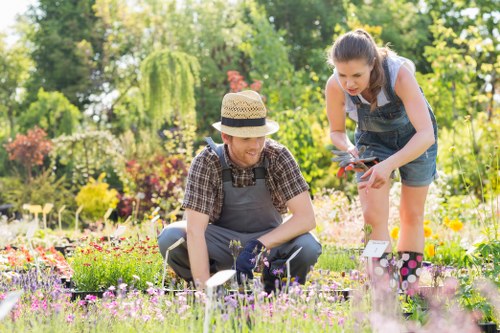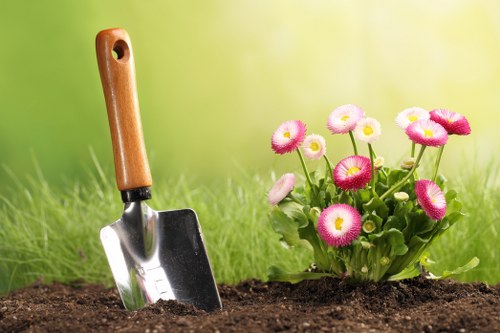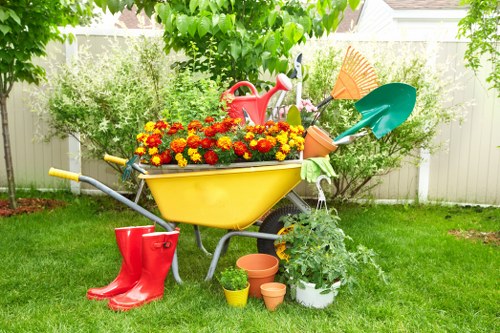Landscape Gardening in Garden Maintenance
Introduction to Landscape Gardening

Landscape gardening plays a crucial role in maintaining the aesthetic and functional aspects of outdoor spaces. Whether it's a residential backyard or a commercial property, effective landscape gardening enhances curb appeal, provides a serene environment, and contributes to the overall value of the property.
In this article, we will explore the various facets of landscape gardening within the realm of garden maintenance. From selecting the right plants to implementing sustainable practices, understanding these elements can help you create and maintain a beautiful garden all year round.
Proper garden maintenance ensures that your landscape remains healthy, vibrant, and free from pests and diseases. It involves a combination of regular care, thoughtful design, and strategic planning.
Planning Your Landscape

Assessing Your Space
Before diving into any gardening project, it's essential to assess the space you have. Consider factors such as soil quality, sunlight exposure, and existing vegetation. This assessment will guide your decisions on plant selection and garden layout.
Understanding the microclimates within your garden can also help in placing plants in locations where they will thrive. For example, some areas may receive more sunlight, making them ideal for sun-loving plants, while others might be naturally shaded.
Creating a detailed plan or blueprint of your garden can help visualize the end result and identify any potential challenges early on.
Choosing the Right Plants

Plant Selection
Selecting the right plants is fundamental to landscape gardening. It's important to choose species that are well-suited to your local climate, soil conditions, and the amount of sunlight your garden receives.
Consider the growth habits of plants, their maintenance requirements, and how they will complement each other in terms of color, texture, and form. Native plants are often a great choice as they are adapted to the local environment and require less maintenance.
Incorporating a mix of perennials, annuals, shrubs, and trees can add variety and interest to your garden throughout the seasons.
Soil Preparation and Fertilization

Improving Soil Health
Healthy soil is the foundation of a thriving garden. Regular soil testing can help determine its pH level and nutrient content, allowing you to make informed decisions about fertilization and amendments.
Adding organic matter such as compost or aged manure can improve soil structure, enhance nutrient availability, and increase water retention. Mulching is another effective practice that helps regulate soil temperature, retain moisture, and suppress weeds.
Proper fertilization ensures that plants receive the essential nutrients they need for growth and resilience. It's important to choose the right type of fertilizer based on your soil test results and the specific requirements of your plants.
Watering Techniques

Efficient Irrigation
Watering is a critical aspect of garden maintenance. Overwatering can lead to root rot and other plant diseases, while underwatering can stress plants and stunt their growth.
Implementing efficient irrigation systems, such as drip irrigation or soaker hoses, can help deliver water directly to the plant roots, reducing waste and ensuring consistent moisture levels.
It's best to water your garden early in the morning or late in the evening to minimize evaporation and maximize water absorption. Additionally, grouping plants with similar water needs together can simplify your watering routine.
Pest and Disease Management
Preventative Measures
Managing pests and diseases is essential for maintaining a healthy garden. Regular monitoring and early detection can prevent minor issues from becoming major problems.
- Integrated Pest Management (IPM): Combines biological, cultural, physical, and chemical tools to manage pests sustainably.
- Natural Predators: Encourage beneficial insects like ladybugs and lacewings that prey on common garden pests.
- Organic Treatments: Use neem oil, insecticidal soaps, and other organic treatments to control harmful pests without harming beneficial organisms.
Maintaining plant health through proper watering, fertilization, and pruning can also reduce susceptibility to diseases.
Pruning and Trimming
Maintaining Plant Structure
Regular pruning and trimming help maintain the desired shape and size of plants, promote healthy growth, and enhance flowering. It's important to use the correct techniques and tools to avoid damaging plants.
- Remove dead or diseased branches to prevent the spread of infections.
- Thin out dense areas to improve air circulation and light penetration.
- Shape shrubs and trees to maintain an attractive form and encourage robust growth.
Timing is crucial; different plants have specific pruning seasons that yield the best results.
Mulching and Weed Control
Enhancing Garden Health
Mulching is a valuable practice in garden maintenance, offering multiple benefits such as moisture retention, temperature regulation, and weed suppression.
Organic mulches like wood chips, straw, and compost not only provide these benefits but also improve soil structure as they decompose. Inorganic mulches like gravel or plastic can be used in specific areas where organic mulches are unsuitable.
- Apply a 2-3 inch layer of mulch around plants, keeping it a few inches away from stems and trunks to prevent rot.
- Regularly replenish mulch to maintain its effectiveness.
- Use mulch as a decorative element to enhance the visual appeal of your landscape.
Combining mulching with proper weed control strategies can significantly reduce the labor involved in maintaining your garden.
Sustainable Practices in Landscape Gardening
Eco-Friendly Approaches
Incorporating sustainable practices into landscape gardening not only benefits the environment but also creates a resilient and low-maintenance garden.
Consider the following eco-friendly approaches:
- Rainwater Harvesting: Collect rainwater for irrigation to reduce reliance on municipal water sources.
- Native Planting: Use native species that require less water, fertilizers, and pesticides.
- Composting: Recycle garden waste and kitchen scraps to create nutrient-rich compost for soil enrichment.
- Solar Lighting: Utilize solar-powered garden lights to minimize energy consumption.
Adopting these practices contributes to a healthier ecosystem and can lead to cost savings in the long run.
Seasonal Garden Maintenance
Year-Round Care
Effective landscape gardening requires attention to seasonal changes and adapting maintenance routines accordingly.
Here’s a quick overview of seasonal tasks:
- Spring: Plant new species, prune shrubs, apply fertilizers, and prepare beds for the growing season.
- Summer: Regular watering, pest monitoring, mulching, and deadheading flowers to encourage blooms.
- Autumn: Clean up fallen leaves, plant bulbs for spring, and prepare plants for winter.
- Winter: Protect sensitive plants, plan for the next gardening season, and perform tool maintenance.
Understanding and implementing seasonal maintenance tasks ensures your garden remains healthy and beautiful throughout the year.
Tools and Equipment for Garden Maintenance
Essential Gardening Tools
Having the right tools can make garden maintenance tasks more efficient and enjoyable. Here are some essential tools for landscape gardening:
- Pruning Shears: For trimming and shaping plants.
- Garden Fork: Useful for turning soil and incorporating compost.
- Hose and Sprinkler: For effective watering of your garden.
- Loppers: Ideal for cutting thicker branches.
- Wheelbarrow: Handy for transporting materials like soil, mulch, and plants.
Investing in high-quality tools and maintaining them properly will enhance your gardening experience and productivity.
Professional Garden Maintenance Services
When to Seek Expert Help
While DIY garden maintenance can be fulfilling, there are times when professional services can make a significant difference. Hiring landscape gardening professionals ensures that your garden receives expert care and attention.
- Complex Projects: Large-scale landscaping or intricate garden designs benefit from professional expertise.
- Pest and Disease Control: Experts can effectively manage infestations and plant diseases.
- Regular Maintenance: Scheduled maintenance services keep your garden in top condition with minimal effort on your part.
- Seasonal Preparations: Professionals can prepare your garden for seasonal changes, ensuring year-round beauty.
Collaborating with a reputable garden maintenance service can save you time, reduce stress, and help your garden flourish.
Conclusion
Landscape gardening is a multifaceted aspect of garden maintenance that encompasses planning, plant selection, soil care, watering, pest management, and more. By understanding and implementing these principles, you can create a vibrant and sustainable garden that enhances your living space.
Whether you choose to maintain your garden yourself or seek professional services, the key is consistency and attention to detail. Embrace sustainable practices and adapt to the changing seasons to ensure your landscape remains beautiful and healthy throughout the year.
Ready to transform your garden? Contact us today to book your landscape gardening maintenance service and take the first step towards a stunning outdoor space.